Share
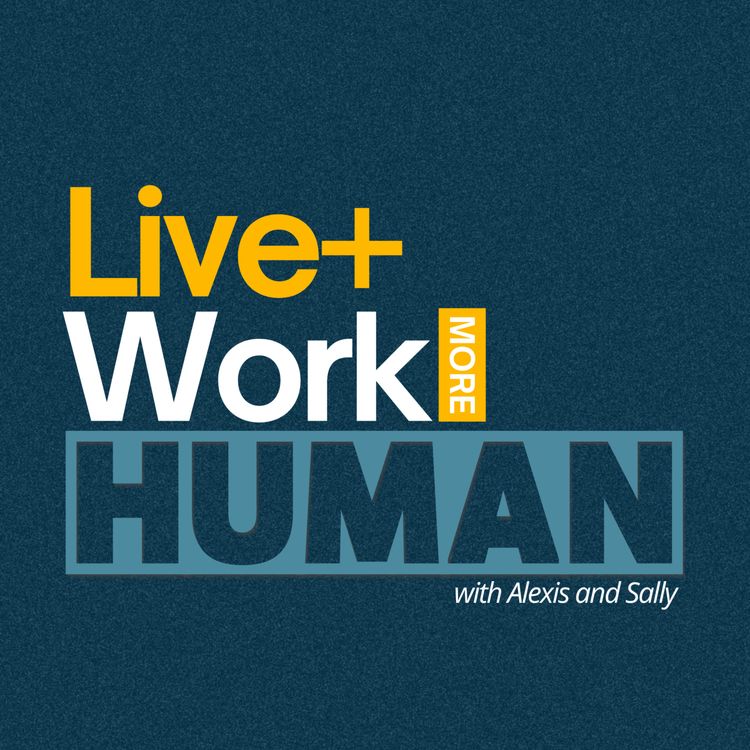
Live+Work More Human
You Only Die Once: How to Live a Squander-Free Life with Jodi Wellman
It’s an undeniable truth that you only die once. And yet as today’s guest explores with us, many of us are already living like the un-dead. Each day passes by with a distinct lack of meaning and vitality.
So how can Memento Mori - remembering we must die - actually make our lives better?
In this conversation we explore the very real reality that we'll all die someday in the future with speaker and Author Jodi Wellman.
Although a seemingly morbid concept, Jodi implores us to view our imminent death as a motivator to live our best life, one that’s wide with vitality and deep with meaning, every single day. And in this conversation she’ll help us understand how.
This conversation was deeply personal for us for various reasons, we explore in the conversation with Jodi, and it’s one that we hope will inspire you to look differently at your work, leadership and life decisions.
Find out more in our shownotes: https://www.wearehumanleaders.com/podcast/you-only-die-once-jodi-wellman
More episodes
View all episodes
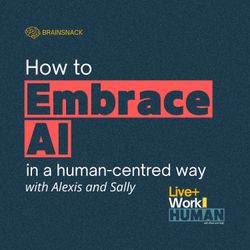
4. Brain Snack: How to Embrace AI in a Human-Centred Way
13:06||Season 4, Ep. 4Yes, it's another brilliant Brain Snack: bite-sized learning moments from Live+Work More Human.In today’s Brain Snack, we discuss the implications of AI on workplaces and teams, and how it can be used to drive positive human-centred outcomes. We share our thoughts on how AI can be used to address challenges like burnout, productivity and employee engagement.For more resources like this one, check out the Live+Work More Human podcast right here.For now, enjoy!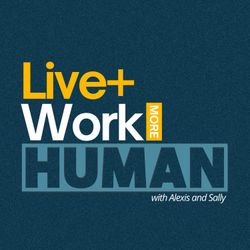
3. Compulsively Productive? How Busyness is Burning you Out!
44:08||Season 4, Ep. 3In this frank and animated conversation, co-hosts Alexis Zahner and Sally Clarke explore the complex relationship between productivity, rest, and burnout. They discuss personal experiences with productivity pressures, the societal expectations that contribute to burnout, and the importance of understanding different forms of rest.This open and insightful dialogue emphasizes the need for self-compassion, the role of therapy and coaching, and practical strategies for preventing burnout while fostering a healthier work-life experience for all of us.Key insights include:Why the struggle with productivity and rest is common among high achievers.How rest should not be viewed as a reward for productivity but as a necessity.The ways societal pressures often dictate our sense of worth based on productivity.Why burnout can occur in both organizational and personal contexts.The power of understanding different types of rest can help in recovery and prevention of burnout.Why therapy and coaching can provide valuable support in managing stress and burnout.The reasons we see self-assessment as crucial in recognizing burnout symptoms.How creating boundaries around work can enhance productivity and well-being.The key reasons finding joy and play in life is essential for mental health.Why, now more than ever, it's important to connect with others and share experiences to combat feelings of isolation. Chapters00:00 Introduction to Chaos and Productivity02:50 The Struggle with Productivity and Rest05:59 The Impact of Childhood on Productivity Mindset09:00 Understanding Different Types of Rest11:55 Navigating Faux Productivity14:55 The Connection Between Worth and Productivity17:59 Societal Pressures and Personal Value20:56 The Pervasiveness of Burnout and Its Consequences24:29 Understanding Burnout: Personal Experiences and Definitions30:09 The Role of Therapy and Coaching in Managing Burnout36:09 Practical Strategies for Preventing Burnout40:56 Finding Joy and Play in Life Despite ChallengesLearn more, including the links to the episode with Dr Saunda Dalton Smith, right here https://www.wearehumanleaders.com/podcast/f-productivity-busyness-burnout
2. We Have Exciting News!
09:06||Season 4, Ep. 2In this episode, Sally Clarke and Alexis Zahner discuss the rebranding of the podcast to 'Live+Work More Human' (formerly We Are Human Leaders), and the introduction of their new partner, Humanico. They emphasize the importance of human-centered outcomes in leadership and the need for connection in hybrid and remote teams. The conversation also highlights the exciting themes and topics planned for the upcoming season, focusing on personal development and the integration of skills in both personal and professional contexts.Key TakeawaysRebranding reflects a broader understanding of leadership.Humanico provides a platform for organizational intelligence.Self-leadership is crucial for personal and professional growth.Skills learned in work apply to personal relationships.The split between work and life is arbitrary.Community feedback shaped the rebranding decision.The podcast aims to invite everyone into the conversation.Future episodes will cover practical skills and strategies.The focus is on becoming the best version of ourselves.Learn more at http://liveandworkmorehuman.com/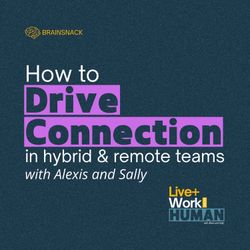
1. Brain Snack: How to Drive Connection in Hybrid and Remote Teams
08:15||Season 4, Ep. 1Welcome to Brain Snacks: bite sized learning moments from Live and Work More Human.In today’s Brain Snack, we share practical advice for driving more connection and belonging in hybrid and remote teams. And the do’s and don’ts for using online technology for connection, and how to best use time together wisely to drive deeper relationships.For more resources like this one, check out the Live and Work More Human podcast right here.For now, enjoy!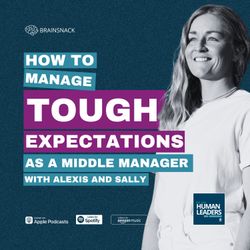
53. Brain Snack: How to Manage Tough Expectations as a Middle Manager
08:36||Season 3, Ep. 53Welcome to Brain Snacks: bite sized learning moments from We Are Human Leaders.In today’s brain snack, we share advice for managers struggling to manage team productivity and not burn themselves out. This includes practical tips to help you manage up successfully. This is part of a four part brainsnack series where we answer your questions.For more, check resources like this one, check out the We Are Human Leaders podcast right here www.wearehumanleaders.com/podcastFor now, enjoy!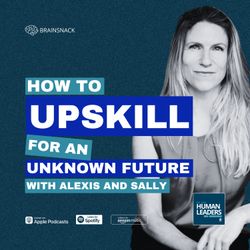
52. Brain Snack: How to Upskill for an Unknown Future
06:56||Season 3, Ep. 52Welcome to Brain Snacks: bite sized learning moments from We Are Human Leaders.In today’s brain snack, we discuss how to upskill for a future that’s uncertain and unpredictable. We share our expert insights on the mindsets and behaviours that will be critical for success now, and into the future. This is part of a four part Brain Snack series where we answer your questions.For more resources like this one, check out the We Are Human Leaders podcast right here www.wearehumanleaders.com/podcastFor now, enjoy!
51. Unlock Your Creativity and Innovation Potential with Tessa Forshaw and Rich Braden
55:48||Season 3, Ep. 51A must listen for everyone who wants to tap into their creativity with ease and intention! This thought-provoking conversation with authors of the brilliant new Innovation-ish Tessa Forshaw and Rich Braden explores the multifaceted nature of innovation, emphasizing that it is not solely the domain of lone geniuses but rather a collaborative effort that requires curiosity, empathy, and humility.We discuss the importance of redefining what it means to be an innovator, the myths surrounding innovation hesitation, and the critical role of leadership in fostering a safe environment for creativity. The discussion also delves into practical strategies for integrating innovation into daily life, the significance of mindset, and the power of metacognition in enhancing creative problem-solving abilities.Key learningsInnovation is about passion and grit to solve problems.Curiosity, empathy, and humility are essential human qualities for innovation.The myth of the lone genius in innovation is misleading.Collaboration is crucial for generating innovative ideas.Mindsets influence how we perceive and approach problems.Cognitive caution can hinder creativity but is a natural human process.Creating a safe space encourages idea sharing and innovation.Leaders play a vital role in fostering an innovative environment.Innovation should be integrated into daily practices, not treated as a special event.Metacognition enhances our ability to innovate by allowing us to reflect on our thinking.Chapters00:00 Defining Innovation: A New Perspective03:01 The Human Element of Innovation05:59 Innovation Hesitation: Understanding Barriers08:51 The Distinction Between Innovation and Entrepreneurship11:57 Mindsets for Innovation: A Cognitive Approach14:40 Overcoming Self-Censorship in Creative Processes17:53 Creating a Safe Environment for Innovation20:42 The Role of Leadership in Fostering Innovation23:47 Everyday Innovation: Integrating Creativity into Daily Life26:53 Integrating Change Gradually28:19 Understanding Moves in Problem Solving31:22 The Power of Mindset in Innovation35:07 Harnessing Metacognition for Creativity48:41 Practical Steps to Foster Innovation52:48 Introduction to Human Leadership53:51 Cognitive Science and Innovation54:56 The Role of Creativity in LeadershipLearn more about Tessa and Rich, order your copy of their book, and access your free BONUS Mind Map, right here https://www.wearehumanleaders.com/podcast/unlock-your-creativity-innovation-potential-with-tessa-forshaw-rich-braden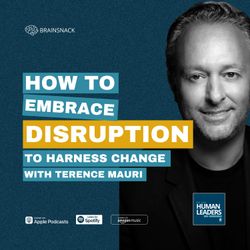
50. Brain Snack: How to Embrace Disruption to Harness Change
09:31||Season 3, Ep. 50Welcome to Brain Snacks: bite sized learning moments from We Are Human Leaders.In today’s brain snack, Author and Disruption Expert Terence Mauri shares with Alexis and Sally his take on how leaders need to be framing disruption to harness change and remain relevant. He shares with us the risks of doing nothing in a rapidly changing world, and how AI is as much about people as it is about technology. For more, check out the full conversation How to Befriend Uncertainty with Terence Mauri here.For now, enjoy!
49. Stop Competing, Start Succeeding: Rethinking Ambition with Ruchika Malhotra
40:47||Season 3, Ep. 49In this powerful conversation, author and global thought leader Ruchika T. Malhotra discusses her brilliant new book Uncompete: Rejecting Competition to Unlock Success, which challenges the traditional notions of competition in the workplace and life. She emphasizes the importance of collaboration, community, and an abundance mindset as essential elements for success.The wide-ranging discussion explores various myths surrounding competition, the need to reset our mindsets, and the significance of reframing comparison. Ruchika also highlights the necessity of seeking peace as a form of resistance against societal pressures.Key Takeaways from this potent conversation with Ruchika:How uncompete is about rejecting the zero-sum mindset.Why collaboration leads to greater success than competition.The many ingrained beliefs we have about competition are harmful.The key reasons resetting our mindset is crucial for personal growth.How comparison can be reframed to motivate rather than discourage.Why building community is essential for mental health and success.The legitimate concerns around male loneliness in society right now.Why success should be redefined to include community and support.How seeking peace is a powerful form of resistance.Why abundance mindset fosters collaboration and innovation.Learn more about Ruchika Malhotra, her amazing new book, and her work right here.Thanks for being a part of the We Are Human Leaders community!